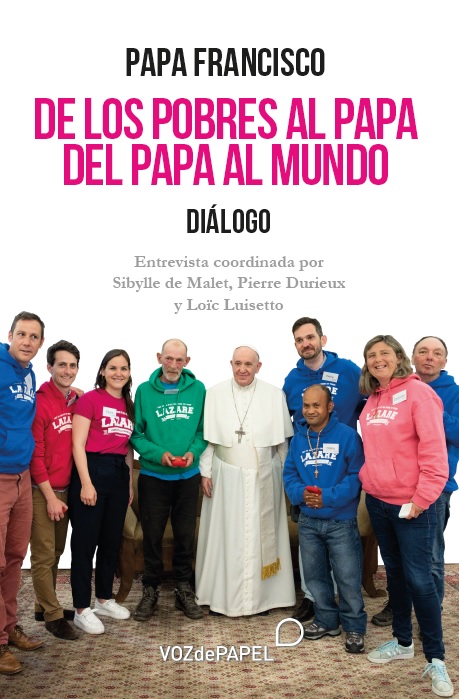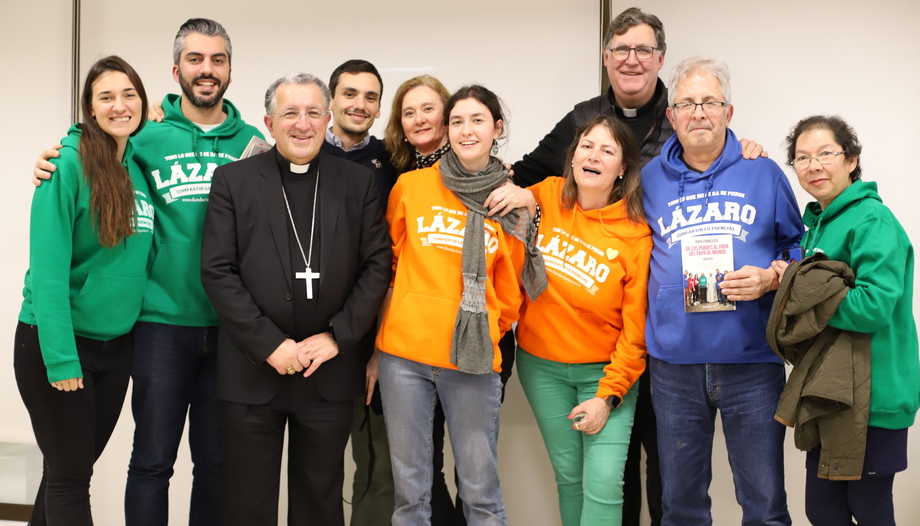In order not to leave you in doubt, the answer to the question in the title is given first, to cite just one of many.
- Poor: "Holiness, your influence is great in the world. May I ask you what you are doing against the injustice that reigns in it?"
- PapaI speak, I try to bear witness, as I have told you, and as far as possible, to be a just person. I underline this because the injustice of this is always there. I try to bear witness to poverty" (..) How to slap injustice in the world? With words, sometimes I say very hard things, and I repeat them. I speak, I preach, I say things that some people don't like. And that's why they get angry with me (...). Some people tell me that I am a communist. But if we take the poor out of the Gospel, the Gospel collapses. (...) All this is found in my encyclicals and exhortations. The last of these, "Fratelli tutti", speaks very clearly about this".
From the poor to the Pope

On "the wealth of the Church".
- Poor: "How can you allow what is happening in the world? I am scandalized by the wealth of the Church and by the papal ring."
- Pope: "First of all, let it be very clear, "the wealth of the Church" is the wealth of the Vatican State and of St. Peter's Basilica. We cannot sell it in little pieces to make money... Artistic riches are also part of the wealth of the Church. It is found, for example, in the chapels, or in those objects of value that a parish has in its custody. These riches belong to everyone, they are not private property.
Then there are the other riches, the bad ones, which Maite points out here, such as the papal ring.
This ring is the ring of my first love, the ring of June 27, 1994. It is the day I was consecrated bishop. When you get married you get a ring that represents your love. And you don't change it, because you don't change your love. I don't change it either ((and he continues)).
The great virtue that I wish for the whole Church, beginning with the Pope, the cardinals, the priests, the religious men and women, is poverty. A Basque saint, St. Ignatius of Loyola, said that the poverty of ecclesiastics is the mother and the wall of life. Why is poverty a mother? Because it engenders generosity, the gift of oneself to others (...) If someone sees a rich ecclesiastic, let him pray for him, and if he has the possibility, let him talk to him".
Francisco "in a pure state".
"These pages constitute a simple, direct and enlightening dialogue between the poor and the Pope, and through them with all of us, Christians, believers or not, members of the entire human family, who, whether we recognize it or not, are also poor, particularly those who believe they are not". This is how Father Álvaro Cárdenas, founding president of Lázaro España and responsible for the Spanish edition, defined it.
This is a face-to-face and heart-to-heart conversation with the Pope. A wide-ranging interview with questions and answers in the open. According to the editors, Francis did not shy away from any of them.
In this book we find Francis "in his pure state," said the Bishop of Getafe, Monsignor Ginés García Beltrán, at the presentation. An interview that offers confidences about "the most human side of the Pope and the depth of his heart," the most difficult moments of darkness through which he has passed, and "which also shows his special sensitivity for the poor and the denunciation of an unjust world that excludes the poor. "He speaks of dignity, shame, exclusion, the sin of the poor distribution of wealth, private property and the universal use of goods, the man in the street and the importance of the family". And of course "of the meaning of life", "of faith, suffering and hope", said Bishop García Beltán.
At the end of his reading "you can say that you know him a little more, that he is more a part of you, of your family," added Don Ginés, after thanking the Lazaro homes for this dialogue with the Pope and for the gift they have given us with their publication, expressing his wish that the Lazaro homes could soon become a reality in the south of Madrid.
Pope's triple conviction
Álvaro Cárdenas affirmed that this unusual meeting of the poor of the earth with Francis in the form of an interview responds to the triple conviction that the Pope has expressed in his apostolic exhortation "...".Evangelii gaudium".
In the first place, "they have much to teach us", in particular about the suffering Christ, whom they know from their own sufferings. Secondly, that "the new evangelization is an invitation to recognize the salvific power of their lives and to place them at the center of the Church's journey. And then, that "we are called to discover Christ in them, (...), to be their friends, to listen to them, to interpret them, and to gather the mysterious wisdom that God wants to communicate to us through them".
Regarding the Lazaro homes, Cardenas noted: "Lazarus is more than a social project or beautiful shared apartments, it is more than a response to the needs of people at risk of exclusion.". The Lazaro association, known for its collaborative housing projects between young people and homeless people, has already established homes in Madrid and Barcelona, and plans to open others in Puerto de Santa Maria and south of Madrid. This book represents another step in its mission to connect the most disadvantaged with influential voices worldwide.











